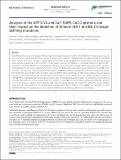Analysis of the ARTIC V4 and V4.1 SARS-CoV-2 primers and their impact on the detection of Omicron BA.1 and BA.2 lineage-defining mutations
Abstract
The ARTIC protocol uses a multiplexed PCR approach with two primer pools tiling the entire SARS-CoV-2 (severe acute respiratory syndrome coronavirus 2) genome. Primer pool updates are necessary for accurate amplicon sequencing of evolving SARS-CoV-2 variants with novel mutations. The suitability of the ARTIC V4 and updated V4.1 primer scheme was assessed using whole genome sequencing of Omicron from clinical samples using Oxford Nanopore Technology. Analysis of Omicron BA.1 genomes revealed that 93.22 % of clinical samples generated improved genome coverage at 50× read depth with V4.1 primers when compared to V4 primers. Additionally, the V4.1 primers improved coverage of BA.1 across amplicons 76 and 88, which resulted in the detection of the variant-defining mutations G22898A, A26530G and C26577G. The Omicron BA.2 sub-variant (VUI-22JAN-01) replaced BA.1 as the dominant variant by March 2022, and analysis of 168 clinical samples showed reduced coverage across amplicons 15 and 75. Upon further interrogation of primer binding sites, a mutation at C4321T [present in 163/168 (97 %) of samples] was identified as a possible cause of complete dropout of amplicon 15. Furthermore, two mutations were identified within the primer binding regions for amplicon 75: A22786C (present in 90 % of samples) and C22792T (present in 12.5 % of samples). Together, these mutations may result in reduced coverage of amplicon 75, and further primer updates would allow the identification of the two BA.2-defining mutations present in amplicon 75: A22688G and T22679C. This work highlights the need for ongoing surveillance of primer matches as circulating variants evolve and change.
Citation
Ulhuq , F R , Barge , M , Falconer , K , Wild , J , Fernandes , G , Gallagher , A , McGinley , S , Sugadol , A , Tariq , M , Maloney , D , Kenicer , J , Dewar , R , Templeton , K & McHugh , M P 2023 , ' Analysis of the ARTIC V4 and V4.1 SARS-CoV-2 primers and their impact on the detection of Omicron BA.1 and BA.2 lineage-defining mutations ' , Microbial Genomics , vol. 9 , no. 4 , 000991 . https://doi.org/10.1099/mgen.0.000991
Publication
Microbial Genomics
Status
Peer reviewed
ISSN
2057-5858Type
Journal article
Collections
Items in the St Andrews Research Repository are protected by copyright, with all rights reserved, unless otherwise indicated.

